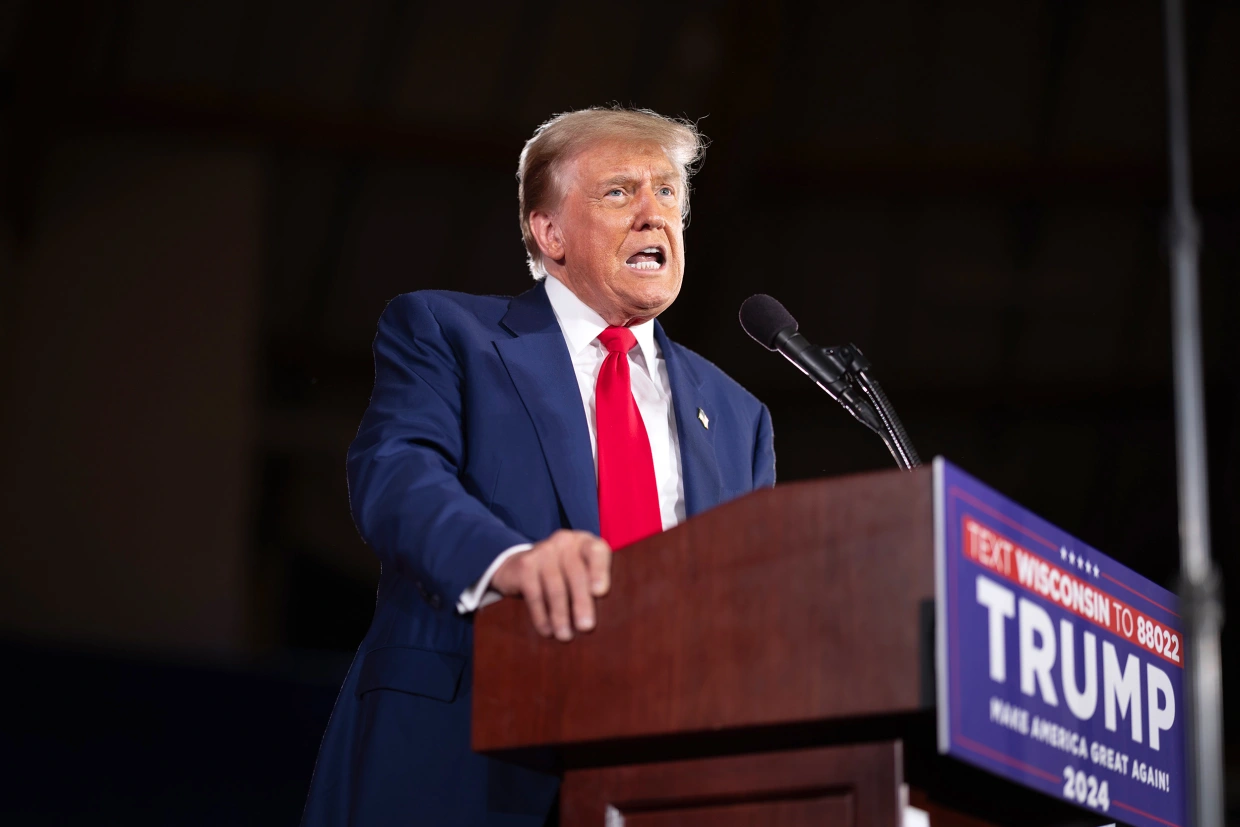Exploring the hypothetical scenario of Donald Trump as the 47th President of the United States offers a captivating glimpse into the potential trajectory of American governance under his leadership. This speculative analysis provides a platform to envision the policies, decisions, and societal shifts that could transpire in this alternative reality. By delving into this thought experiment, we can examine the implications of Trump’s return to power on various aspects of American life, including economic strategies, foreign relations, and societal dynamics. This exercise in speculative analysis enables a deeper understanding of the potential impacts and consequences of a hypothetical 47th Trump presidency on the nation and its citizens.
Envisioning a future where Donald Trump assumes the role of the 47th President allows for a critical examination of the proposed Agenda 47, a strategic blueprint that outlines his intended focus areas such as energy, immigration, and reshaping the Republican Party. By scrutinizing the details of this agenda and its potential ramifications, we can gain insights into the policy directions, governance style, and ideological underpinnings that may characterize a Trump-led administration. This speculative exploration not only sheds light on the hypothetical policies and decisions underpinning this alternative presidency but also prompts reflection on the broader implications for American society, economy, and global relations.
Moreover, by setting the stage for this speculative analysis, we open the door to a nuanced examination of the key areas of focus and potential outcomes that could define a 47th Trump presidency. This exercise in hypothetical thinking encourages us to consider the unforeseen challenges, opportunities, and transformations that may unfold under such a scenario. By contemplating the alternative history of an America shaped by Donald Trump as its 47th President, we can engage in a critical dialogue about the nature of leadership, governance, and democratic principles in shaping the nation’s future trajectory.
Hypothetical Policies and Decisions under Trump’s 47th Presidency
In the realm of urban policies, the hypothetical creation of “freedom cities” under a 47th Trump presidency could serve as a unique experiment in governance. By designating specific areas as “freedom cities,” Trump’s administration might aim to foster a sense of individual liberty and conservative values within these urban enclaves. This policy proposal could spark debates about the balance between local autonomy and federal oversight, raising questions about the boundaries of municipal authority in shaping community values and regulations.
Expanding on the potential reinstatement of the “stay in Mexico” policy for migrants under a hypothetical 47th Trump presidency, it’s crucial to consider the broader implications for immigration dynamics and border security. This decision could have ripple effects on asylum processes, humanitarian considerations, and international relations, impacting the treatment of migrants and the management of cross-border movements. By exploring the motivations behind such a policy shift and its potential consequences, we can gain a deeper understanding of the complexities surrounding immigration enforcement and refugee protection.
Furthermore, the contemplation of cutting international aid as part of Trump’s hypothetical presidency underscores the interconnected nature of global affairs and domestic policy priorities. A reduction in international assistance could reverberate across diplomatic relationships, development initiatives, and humanitarian programs, signaling a shift in America’s role on the world stage. This proposed policy stance raises questions about the ethical considerations of foreign aid allocation, the impact on recipient nations, and the broader implications for U.S. soft power and global influence.
Comparison with Actual Trump Presidency
When comparing Donald Trump’s proposed Agenda 47 to his actions during his 45th presidency, it becomes evident that there are substantial differences in policy priorities and governance approaches. For instance, the potential creation of “freedom cities” as part of Agenda 47 represents a departure from conventional urban policy strategies. By emphasizing the establishment of these cities, Trump’s administration could signal a shift towards empowering local communities to enact their regulations and values, challenging the traditional top-down governance models prevalent in urban planning.
Additionally, examining the implications of the reinstatement of the “stay in Mexico” policy for migrants under a hypothetical 47th Trump presidency sheds light on the evolving landscape of immigration enforcement. This policy decision could reshape the dynamics of border control, asylum processes, and international cooperation on migration issues, influencing the treatment of individuals seeking protection and the management of refugee flows. By delving into the strategic considerations driving this policy reversal, we can uncover the underlying motivations and potential consequences of such a shift in immigration policy.
Moreover, the discussion surrounding the cutting of international aid under a hypothetical Trump presidency offers insights into the administration’s foreign policy priorities and resource allocation strategies. By contemplating the implications of reducing global assistance programs, we can analyze the potential impacts on diplomatic relations, development projects, and humanitarian efforts worldwide. This policy stance highlights the administration’s commitment to reshaping America’s engagement with the international community and raises questions about the nation’s role as a global leader in promoting stability and prosperity.
Impact on American Society and Economy
Exploring the potential effects of a hypothetical 47th Trump presidency on American society and the economy unveils a complex landscape of challenges and opportunities. One key area of interest is the economic domain, where policies under this speculative administration could shape the nation’s financial trajectory. For example, the emphasis on protectionist measures and potential cuts in international aid may have far-reaching implications for trade relationships, market dynamics, and consumer behaviors. By unpacking the potential outcomes of these economic strategies, we can gain a comprehensive understanding of how they might impact industries, job markets, and economic growth patterns.
Furthermore, the intersection of economic concerns and housing issues presents a multifaceted terrain that could be transformed under a Trump presidency. The dynamic nature of housing markets, coupled with the broader economic policies proposed, creates a scenario where shifts in national priorities and resource allocation could influence housing affordability, construction trends, and access to homeownership for diverse segments of the population. By envisioning the ripple effects of policies like building “freedom cities” and addressing housing challenges within this speculative context, we can anticipate the social and economic transformations that might unfold under the hypothetical 47th presidency. This exploration not only sheds light on the interconnected nature of economic and societal domains but also underscores the importance of considering diverse perspectives and potential outcomes in shaping future policy discussions and societal developments.
Foreign Relations and Diplomacy
In the hypothetical scenario of a 47th Presidency under Donald Trump, foreign relations and diplomacy would be subjects of significant scrutiny and speculation. For instance, Trump’s proposed policies include ending the war in Ukraine, a move that could have profound implications for the geopolitical landscape in Eastern Europe and beyond. Additionally, his stance on NATO, with hints of a possible withdrawal, raises concerns about the stability of this critical alliance and the broader implications for global security. By examining the potential repercussions on foreign relations, particularly with countries like Ukraine, we can gain insights into the strategic shifts and diplomatic challenges that may arise under a Trump administration.
Expanding on the analysis of how a Trump presidency might affect global diplomacy and U.S. international alliances offers a nuanced perspective on the potential shifts in the international arena. By considering his past approaches and statements during his 45th presidency, such as his America First doctrine and skepticism towards multilateral agreements, it becomes evident that a 47th Trump presidency could herald a departure from traditional diplomatic norms. This departure could have repercussions not only for longstanding allies but also for emerging powers and adversaries, shaping a new landscape of international relations that diverges from the trajectory set by previous administrations. By delving into the intricacies of potential foreign policy decisions and their implications, we can paint a comprehensive picture of how a Trump presidency might reshape America’s global engagements and alliances.
Public Opinion and Political Engagement Trends
The insights gleaned from the Spring 2024 Harvard Youth Poll shed light on the evolving landscape of public opinion and political engagement in the context of a potential Trump presidency. The heightened engagement among young Americans in the upcoming Presidential election underscores a growing interest in economic issues and housing concerns, signaling a shift in voter priorities and policy considerations. By delving into the nuances of young voters’ motivations and preferences, we can discern the factors shaping their political decisions and the potential impact on electoral outcomes.
Amidst the discussions surrounding a hypothetical return of Donald Trump to power in 2025, public sentiments remain divided, with apprehensions about authoritarian tendencies and concerns about democratic governance. The discourse surrounding the possibility of a Trump presidency reflects broader societal anxieties about the implications of such a scenario. By examining public sentiments and reactions to the prospect of a second Trump term, we can gauge the pulse of the nation and the prevailing attitudes toward democratic principles and governance. This intersection of public opinion and political engagement underscores the significance of citizen involvement in shaping the trajectory of American democracy and highlights the importance of informed and active participation in safeguarding democratic values.
Concerns and Warnings About a Hypothetical Trump Presidency
Hillary Clinton’s warnings about the risks associated with a second Trump term go beyond mere political rhetoric. Her concerns about the potential erosion of American democracy under a hypothetical 47th Trump presidency underscore the gravity of the situation. By openly expressing intentions to implement controversial policies and wield executive power in unprecedented ways, Trump’s proposed agenda raises red flags about the preservation of democratic norms and constitutional principles. The urgency to address these apprehensions and fortify democratic safeguards takes on heightened significance in the face of potential threats to the rule of law and democratic governance.
Moreover, the apprehensions voiced by experts and political figures about Trump’s authoritarian inclinations and the ramifications for democratic institutions underscore the need for vigilance and proactive measures to protect democratic values. The fear of executive overreach, disregard for institutional checks and balances, and erosion of democratic norms pose a significant challenge to the fabric of American governance. By engaging in a critical dialogue about the risks and implications of a hypothetical Trump presidency, we can underscore the imperative of upholding democratic principles, preserving the rule of law, and defending the integrity of democratic institutions against potential threats.
Safeguarding American Democracy and Governance
In the hypothetical scenario where Donald Trump becomes the 47th President of the United States, safeguarding American democracy and governance becomes an urgent imperative. Proposed measures to mitigate the perceived threats of authoritarianism under a Trump presidency include reinforcing the separation of powers and ensuring robust checks and balances within the government. By fortifying the independence of the executive, legislative, and judicial branches, the nation can uphold the principles of democratic governance and prevent any potential abuse of power by the presidency.
Furthermore, discussions around upholding the core tenets of American democracy amidst the specter of a Trump presidency emphasize the need to protect democratic institutions and uphold the rule of law. Safeguarding democratic norms, such as freedom of the press, judicial independence, and electoral integrity, is paramount in preserving the democratic fabric of the nation. By prioritizing accountability, transparency, and ethical governance, the nation can navigate the challenges posed by a hypothetical return of Donald Trump to power and reinforce the resilience of its democratic system. Proactive steps, such as promoting civic engagement, fostering public discourse, and reinforcing democratic values, are essential in safeguarding American democracy against potential threats to its integrity.
For more on Politics, be sure to visit Mecella.



No responses yet